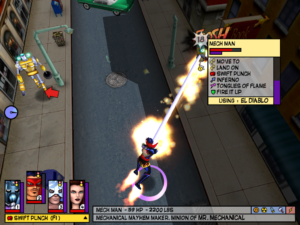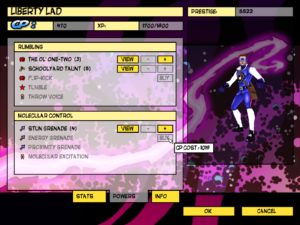Freedom Force: UI
 The user interface in Freedom Force is generally a joy to use. It’s a really good example of a mature system, but with a few bits of experimental oddity. The maturity mainly has to do with streamlining commonly-executed actions and providing multiple ways of doing things — for example, that you can select characters by clicking on them, or by clicking on their portrait at the bottom of the screen, or by pressing the number keys corresponding to those portraits. Since I’m used to using the number keys to switch weapons in first-person shooters, I find this last approach easiest. This is why I know that you can also use the number keys in ways more commonly associated with the mouse, such as double-tapping (which centers the viewport on that character), or pressing in combination with the shift key (to select more than one character at once, just like selecting multiple items in a drop-down menu). Of course, when you select multiple characters, it’s most commonly because you want to select all of them, to send them to a particular point on the map. This is simplified to a single key-press, and furthermore, one that’s easily discoverable by accident. (It’s the 5 key, just one to the right of the last hero hotkey.)
The user interface in Freedom Force is generally a joy to use. It’s a really good example of a mature system, but with a few bits of experimental oddity. The maturity mainly has to do with streamlining commonly-executed actions and providing multiple ways of doing things — for example, that you can select characters by clicking on them, or by clicking on their portrait at the bottom of the screen, or by pressing the number keys corresponding to those portraits. Since I’m used to using the number keys to switch weapons in first-person shooters, I find this last approach easiest. This is why I know that you can also use the number keys in ways more commonly associated with the mouse, such as double-tapping (which centers the viewport on that character), or pressing in combination with the shift key (to select more than one character at once, just like selecting multiple items in a drop-down menu). Of course, when you select multiple characters, it’s most commonly because you want to select all of them, to send them to a particular point on the map. This is simplified to a single key-press, and furthermore, one that’s easily discoverable by accident. (It’s the 5 key, just one to the right of the last hero hotkey.)
The simplest actions within the world can be performed by left-clicking on stuff, thus telling your hero to perform whatever the obvious action is: picking it up, talking to it, or whatever the context demands. If the thing you click on is an enemy, the obvious action is performing your default attack, which you can change at will. If you want to do something else, you can bring up a menu by right-clicking, which automatically pauses the game. Now, there’s a little display area at the bottom of the screen where it gives you a little information about what the cursor is currently over (including a handy summary of what sorts of damage it’s vulnerable and resistant to — yes, even inanimate objects have resistances, which is why, for example, it’s easier to destroy a brick wall with an explosion than with a radiation beam. 1Some seemingly inanimate objects even have mental states. During a mission to destroy a supervillain’s massive ray gun installation, I managed to render it Stunned, complete with animation of stars circling where its head would be if it had a head. ). And this is important information, because sometimes you want to target specific parts of things — the alarm on a guardhouse, for example. But even with that to guide you, it’s easy to right-click on the wrong thing — probably because keeping an eye on that status bar involves looking at a different part of the screen than where the cursor is (a problem with status-bar-based UIs that I’ve noted before). So they made the right-click menu moveable: as long as you keep the right mouse button held down, you can scan around with it, watching the menu change as it goes. This is one of the experimental oddities I mentioned. It should be noted that the background color of the menu changes according to what sort of thing it’s on, making it very easy to stop moving the moment you drag over an enemy.
Hovering over an option in the action menu displays a great deal of information about it: the tooltip area at the bottom turns into a summary of the effects, and the display in the world gives such information as the line to the target (useful for finding out if ranged attacks are blocked), whether or not you’re in range (indicated by the color of aforementioned line), and, if applicable, the blast radius (rendered as a sphere). The action selection menu itself contains a bar chart showing how much Energy you’ll have left if you select the action. You can choose to perform actions you don’t actually have enough Energy for, but you risk winding up Stunned if you do, kind of like spellcasting in Angband. 2It strikes me only now as I write this that I have a couple of heroes that are capable of curing mental states such as Stunned. Perhaps there’s a viable strategem to be made of this, of overpowering all your attacks and letting the cleric take care of the consequences. This is reflected by making the Energy bar flash red — the redder, the riskier. Raising and lowering the charge on your attacks is accomplished by right-clicking on the power to bring up a sub-menu, a rare example of a right-click menu within a right-click menu, and another element that I’d call an experimental oddity. It works, though.
The system for controlling the camera is, in my opinion, the least successful part of the UI.
Using arrow keys or WASD to scroll the viewport is fine, as is zooming up and down with the mouse wheel. (There’s a way to do this with the keyboard as well, but I’ve forgotten it. The wheel is just more convenient.) But I never got the hang of rotating the camera view, which involves combinations of key presses and mouse movement. I generally leave the camera orientation alone, and it works just fine. It means I’m not always ideally situated to see what’s going in in narrow alleyways, but I can always get a good-enough view by zooming way in: once you’re close enough, walls are rendered semi-transparent.
 Outside of the missions, everything is a set of nested menus, with a very satisfying “clunk” sound accompanying every selection. I spend fairly large amount of time in these, specifically in the upgrade section. Whenever a hero levels up, they get 600 “Character Points” to spend on gaining new powers or upgrading existing ones, and it’s always an agonizing choice. (The worst of it is that some powers cost more than 600 CP, so you can only afford them if you forgo upgrading for a level.) This is also where you can get full information on each ability’s stats, available on a separate screen by clicking the “View” button. And here lies my one complaint about the UI. In order to decide whether to spend the points on upgrading an ability, I need to know how the upgrade will affect it. The only way to find this out is by going to the “View” screen, committing its contents to memory, backing out, upgrading it, and then going to the “View” screen again. It could be worse: at least you’re allowed to undo your purchases (until you commit them by leaving the upgrade menu entirely). But I can think of any number of CRPGs that handle this better, displaying the current and improved stats side-by-side, sometimes with highlight colors. I hope the sequel addresses this.
Outside of the missions, everything is a set of nested menus, with a very satisfying “clunk” sound accompanying every selection. I spend fairly large amount of time in these, specifically in the upgrade section. Whenever a hero levels up, they get 600 “Character Points” to spend on gaining new powers or upgrading existing ones, and it’s always an agonizing choice. (The worst of it is that some powers cost more than 600 CP, so you can only afford them if you forgo upgrading for a level.) This is also where you can get full information on each ability’s stats, available on a separate screen by clicking the “View” button. And here lies my one complaint about the UI. In order to decide whether to spend the points on upgrading an ability, I need to know how the upgrade will affect it. The only way to find this out is by going to the “View” screen, committing its contents to memory, backing out, upgrading it, and then going to the “View” screen again. It could be worse: at least you’re allowed to undo your purchases (until you commit them by leaving the upgrade menu entirely). But I can think of any number of CRPGs that handle this better, displaying the current and improved stats side-by-side, sometimes with highlight colors. I hope the sequel addresses this.
| ↑1 | Some seemingly inanimate objects even have mental states. During a mission to destroy a supervillain’s massive ray gun installation, I managed to render it Stunned, complete with animation of stars circling where its head would be if it had a head. |
|---|---|
| ↑2 | It strikes me only now as I write this that I have a couple of heroes that are capable of curing mental states such as Stunned. Perhaps there’s a viable strategem to be made of this, of overpowering all your attacks and letting the cleric take care of the consequences. |
 Comments(0)
Comments(0)